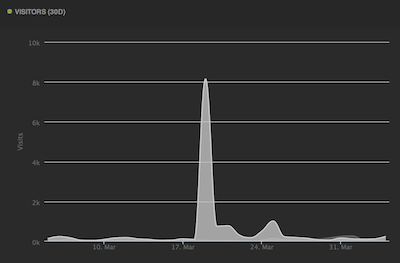Read our latest: The year so far & 1.0 update.
Last week we released BRJS v0.6 that provides an incremental improvement upon v0.5. Since it's just an incremental improvement there's not much to shout about. If you'd like to get a copy of the latest release you can download directly below.
So instead of talking about the latest release I thought I'd share some stats about our open sourcing process and the uptake of BRJS.
We've set out open sourcing BRJS in the hope that others use it and get benefit from it. From there we hope that we can gain from the knowledge, thoughts and potentially contribution of others. The project actually kicked off in June 2013 but it wasn't until March 2014 we did our big first public event (QCon London). Until that point we put a lot of hard work into design and development (a considerable re-write of the exiting BladeRunner codebase), got a website up, did a couple of talks and wrote a few blog posts.
The goal for the public part of the open sourcing process has been to raise awareness that BladeRunnerJS even exists and share some of the concepts and goals.
In attempt to achieve awareness we've done the following, most of it since January 2014:
Looking at stats alone this has resulted in:

My feeling is that we've gained a reasonable amount of awareness. From the conversations I've had after talks and from some of the feedback I've received, we need to clarify "the message" regarding a number of things about what BRJS is and what it offers e.g. it's not a replacement for AngularJS. It's a toolkit, with a thin slice of application runtime around services.
In order for us to improve BRJS and feed external input into it we need to know what others think. 149 downloads is pretty good, but what has been done from there? Have people been stuck event getting BRJS running, have they had problems with the Getting Started Guide or have they built amazing applications? We need to know!
So we really need to improve the feedback loop. The focus for the coming months will therefore be:
The feedback will begin with a hands-on workshop that I'm very much looking forward to. The How to Build Front-end Web Apps that Scale Workshop at FutureJS in Barcelona, which is hotting up to be an amazing event. If you're interested you can use the code JSWEEKLY to get 10% discount on the entire event - last batch of tickets just released.
In May I'll be talking about Testing Ginormous JavaScript Apps at ScotlandJS and then in June about the State of Realtime Apps in 2014 and Beyond at Scotch on the Rocks.
If you have downloaded BRJS and have any feedback at all, please drop me an email: phil@leggetter.co.uk.